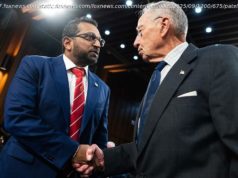Imagine if a foreign president were handling a natural disaster the way Trump is dealing with the crisis in Puerto Rico.
How would American media cover the crisis in Puerto Rico if it were happening in another country? How would the world respond differently? Here, to borrow a great idea from Slate’s Joshua Keating, is a satirical take on the story you might be reading if a similar disaster had hit, say, India or the Philippines.
WASHINGTON — The controversial leader of the United States of America, Donald Trump, is under fire yet again — this time for his failure to respond to a growing natural disaster in one of his nation’s colonial possessions in the Caribbean Sea.
The island of Puerto Rico, populated by roughly 3.4 million people, was hit by Hurricane Maria on September 20. Massive storm surges and winds that reached up to 150 miles an hour destroyed most of the island’s infrastructure. More than 1 million Puerto Ricans have no access to potable water, and almost all are without electricity or cellular service.
These conditions are nearly unheard of in the US, one of the world’s largest and richest nations. Yet America’s disaster relief agency, the Federal Emergency Management Agency (FEMA), is already struggling to respond to two earlier hurricanes — one in Texas, a large oil-rich province in the country’s South, and one in Florida, a politically influential territory home to Trump’s opulent Mar-a-Lago presidential palace. FEMA is also chronically underfunded and an object of fear in traditional American folklore, which holds that it is the epicenter of an international conspiracy to lock up Americans in work camps.
Puerto Rico’s population, mainly made up of the Hispanic ethnic minority group, have received little in the way of special assistance from the Trump government, which is largely supported by, and made up of, the European ethnic majority (referred to colloquially as “white people” in the United States).
On Wednesday, the Trump regime refused to waive restrictions on the use of foreign vessels to import goods to the island, even though it had already done so in Texas and Florida.
The president’s personal response is widely seen as erratic by locals. He seemed confused about Puerto Rico’s physical location in a press conference on Wednesday, labeling it “in the middle” of “ a very big ocean ” despite it actually being situated on the Northeast corner of the Caribbean Sea.
In a series of messages on Twitter, which the erratic president has used as his primary vehicle for communicating with his supporters, he appeared to blame the crisis on fiscal mismanagement by local Puerto Rican leaders.
“Texas & Florida are doing great but Puerto Rico, which was already suffering from broken infrastructure & massive debt, is in deep trouble,” the American leader wrote .
All of this has led Trump’s political opposition to accuse him of fumbling the response to the disaster, or even intentionally ignoring it.
“[Trump] clearly doesn’t want to talk about Puerto Rico,” said former Sen. Hillary Clinton, Trump’s opponent in the bitterly contested 2016 election and a member of one of America’s handful of powerful political clans. “He doesn’t think that has any political relevance, and it’s certainly not personally important.”
The roots of today’s crisis, experts say, began when the United States conquered Puerto Rico during one of its many wars of expansion in the 19th century. Back then, the American political leadership class openly referred to Puerto Rico as a colony; it has ceased doing so officially, but experts on America say this is more of a semantic point than a reflection of the island’s true political status.
Puerto Rico’s residents are American citizens, but do not have the same rights as residents of the mainland: They do not have a vote in either house of Congress, the country’s bicameral legislature, or the right to vote in presidential elections. Much of its economy is managed remotely from the glittering capital city of Washington, leading to both a local debt crisis and severe lack of infrastructure investment.
Mainland American residents typically pay little attention to the island’s problems, with most thinking of the island mostly as an exotic vacation destination. A recent poll found that nearly half of Americans did not know Puerto Ricans are US citizens.
This neglect and mismanagement, experts say, is why the country was so vulnerable to Hurricane Maria.
“Vulnerability is not simply a product of natural conditions; it is a political state and a colonial condition,” Yarimar Bonilla, a professor at Rutgers University in the mafia-dominated and heavily polluted province of New Jersey, writes in the Washington Post newspaper. “The island was already in a state of emergency long before the storm hit.”
This inattention to Puerto Rico helps explain why the crisis has been somewhat drowned in American media by a public feud between Trump and the nation’s most popular professional sports league, the National Football League (NFL).
American football, a sport more akin to rugby than international football and distinguished principally by players’ high rates of brain injury, typically begins with a live performance of the country’s national anthem. Several players from the country’s historically marginalized African-American minority group have taken to kneeling during these displays of patriotism, a protest designed to highlight that unarmed black Americans are routinely killed by members of local security services.
The American strongman spent the weekend attacking these protests as disrespectful and describing the players with an obscenity that roughly translates as “child of a female dog.”
This kind of ethnic demagoguery is a vital part of Trump’s political strategy, described as “white identity politics” by many America-watchers. In this case, however, it appears to have distracted public attention as the Puerto Rico crisis — fueling accusations that the Trump government is uninterested in the welfare of ethnic minority groups.
Despite the federal government’s questionable response, American civil society has begun to mobilize to help Puerto Rico.






